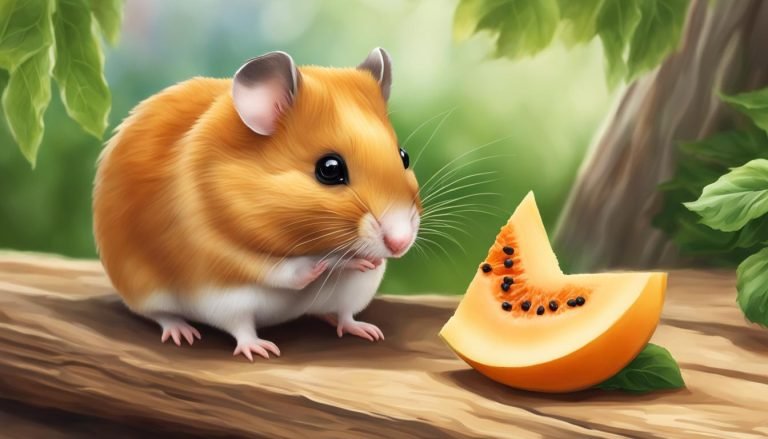Can Hamsters Eat Cranberries? Safe Treat Tips
If you have been snacking on cranberries and wondering if it’s safe to feed them to your pet hamster, the short answer is no.
While it’s best to avoid giving cranberries to your hamster, there are exceptions that we’ll explore so you can make informed decisions about your furry friend’s diet.

Can Hamsters Eat Cranberries?
No, cranberries are not recommended for hamsters because they are high in sugar and fat.
Key Takeaways:
- Cranberries are not recommended for hamsters, but there are a few exceptions.
- Feeding small amounts of cranberries to Syrian and Roborovski hamsters can provide health benefits.
- Cranberries are rich in antioxidants, fiber, and Vitamin C, which can boost the immune system and promote overall health.
- However, cranberries are high in sugar and fat, which can lead to obesity and other health issues.
- If you decide to feed cranberries to your hamster, remove the seeds and wash the berries thoroughly to minimize risks.
The Pros of Feeding Cranberries to a Hamster
Despite the several reasons you shouldn’t feed your hamster cranberries, they provide a few health benefits when fed in small amounts to Syrian and Roborovski’s hamsters.
Cranberries are high in antioxidants that help your pet recover from disease quicker and prevent the occurrence of urinary tract infections by preventing bacteria from sticking to the urinary walls.
Furthermore, cranberries assist in maintaining systolic blood pressure, which can help prevent cardiovascular disease.
Cranberries are also rich in polyphenols, which can help reduce blood pressure, lower triglycerides, and manage blood sugar levels.
The powerful antioxidants present in cranberries can even help prevent the onset of cancer.
In addition, cranberries contain phytonutrients that decrease activity in inflammatory pathways, leading to a healthier pet.
High in Vitamin C, another powerful antioxidant, cranberries can boost the immune system and prevent the onset of disease.
The high fiber content of cranberries helps balance the digestive system of your pet hamster. It prevents constipation and diarrhea by regulating water in the intestines and reduces the risk of colon cancer by expelling harmful ingredients from the body faster than normal, so they don’t have time to rest against the colon walls.
Lastly, cranberries possess antifungal and antiviral properties, making them a great tool for cleaning out the liver and removing toxin buildup that occurs over time due to a bad diet or improper eating.
In summary, while cranberries should be limited in a hamster’s diet, they can provide a range of health benefits when fed in moderation to certain hamster breeds. These include antioxidants for disease recovery and prevention of urinary tract infections, blood pressure maintenance, cancer prevention, immune system boosting, digestive system regulation, and liver detoxification.
The Cons of Feeding Cranberries to a Hamster
If your hamster snuck out and started eating cranberries, you don’t need to worry. It’s not going to kill them. However, there are some good reasons to prevent your hamster from eating cranberries.
Sugar Content in Cranberries
Sugar is the primary ingredient in cranberries that you need to avoid. A single cup of fresh cranberries can contain more than four grams of sugar. Sugar can lead to obesity and several health problems in any animal. They should be strictly limited and only provided as an occasional treat.
Risk of Obesity
Hamsters are susceptible to obesity, and the high sugar content in cranberries can contribute to weight gain. Overconsumption of cranberries may lead to an increased risk of obesity in hamsters.
Diabetes Susceptibility
The Chinese, Russian Campbell’s, and Winter White breeds of hamsters are especially susceptible to diabetes. Therefore, even small amounts of cranberries should be avoided for these breeds due to the potential risk.
High-Fat Content
The seeds in fresh cranberries are high in fat, which can accumulate in your pet’s liver and lead to a fatty liver condition. Hamsters should avoid high-fat foods, including cranberries, to maintain a healthy liver.
It’s important to consider these factors when deciding whether to feed cranberries to your hamster. While cranberries may have some health benefits, the potential risks outweigh them. It’s best to stick to a balanced diet that meets your hamster’s nutritional needs and consult with a veterinarian for specific dietary recommendations.
How to Feed Cranberries to a Hamster

Feeding cranberries to your pet hamster can be done, but it’s important to follow specific guidelines to ensure their safety and well-being. Here’s a step-by-step guide on how to properly feed cranberries to your hamster:
- Choose the right breed: Only Syrian and Roborovski hamsters should consume cranberries. Other breeds such as Chinese, Russian Campbell’s, and Winter White hamsters should avoid cranberries completely due to their susceptibility to certain health conditions.
- Preparation: Hamsters can only eat the berry of the cranberry plant. Remove any leaves or stems and ensure you only provide the edible parts to your hamster.
- Seed removal: While hamsters can eat cranberry seeds, it’s recommended to remove them to reduce fat intake. Simply cut the cranberry in half and remove the seeds before serving it to your hamster.
- Thoroughly wash: Before serving the cranberry to your hamster, make sure to wash it thoroughly. This removes any potential pesticides or chemicals that may be present on the skin. Opt for organic cranberries to minimize the risk of harmful substances.
- Serving size: Place one or two cranberries in a small bowl and offer it to your hamster. Avoid overfeeding by removing the bowl after an hour or two to prevent your hamster from overeating.
- Frequency: It’s important to limit cranberry consumption to no more than once a week. This ensures that your hamster receives the benefits of cranberries without any negative effects.
By following these guidelines, you can safely incorporate cranberries into your hamster’s diet. Remember to prioritize your hamster’s health and well-being when introducing any new food.
Can Dwarf Hamsters Eat Cranberries?
No, dwarf hamsters cannot eat cranberries. Unlike larger hamster breeds, dwarf hamsters are relatively smaller and more fragile, making them unsuitable for consuming cranberries. Additionally, dwarf hamsters have a higher susceptibility to obesity, which further reinforces the need to avoid feeding them cranberries.
While cranberries may offer health benefits to certain hamster breeds, such as Syrian and Roborovski hamsters, it is essential to consider the specific needs and limitations of dwarf hamsters when choosing suitable treats for them. It’s always important to prioritize the well-being and health of our adorable dwarf hamster companions.
Can Hamsters Eat Other Tropical Fruits Like Cranberries?
Absolutely yes! Hamsters can enjoy a variety of tropical fruits in addition to cranberries. However, it is crucial to monitor the amount of tropical fruits you feed to your furry friend.
Tropical fruits can provide a delicious and nutritious variation to your hamster’s diet. Just like cranberries, tropical fruits offer unique flavors and potential health benefits for your pet.
Some popular tropical fruits that you can safely feed to your hamster include:
- Mango: Rich in vitamins A and C, mangoes offer antioxidant properties and promote a healthy immune system.
- Pineapple: This sweet fruit contains bromelain, an enzyme that aids in digestion.
- Coconut: Rich in healthy fats, coconuts can provide an energy boost for your hamster.
- Papaya: High in fiber and vitamin C, papayas can support proper digestion and strengthen the immune system.
- Banana: A great source of potassium, bananas can help maintain healthy heart function in your hamster.
Remember to introduce tropical fruits gradually and in small portions, especially if your hamster has never tried them before. Too much fruit can lead to digestive issues or unwanted weight gain.
Always wash the fruit thoroughly to remove any pesticides or chemicals before offering it to your hamster. Organic varieties are preferred to minimize the risk of exposure to harmful substances.
By incorporating a variety of tropical fruits into your hamster’s diet, you can provide them with a range of nutrients and flavors to keep them happy and healthy.
Final Thoughts
If you’ve ever wondered whether hamsters can eat cranberries, the answer is that it’s generally not recommended. However, if your hamster has already nibbled on some cranberries, there’s no need to panic. In small quantities and on special occasions like Thanksgiving, a few cranberries should not cause harm.
However, it’s important to note that if you own a Chinese, Russian Campbell’s, or Winter White hamster, it’s best to avoid giving them cranberries altogether due to their heightened risk of diabetes. Additionally, it’s important to steer clear of dried cranberries and cranberry sauce as these products typically contain excessive amounts of sugar, which can lead to various health problems for your furry friend.
When it comes to your hamster’s diet, it’s crucial to prioritize their well-being and choose safe treats. While cranberries offer some potential health benefits, their sugar content and associated risks outweigh these advantages. It’s always a good idea to consult with a veterinarian to ensure that your hamster’s diet meets their specific needs and keeps them happy and healthy.
Similar Posts
- Can Hamsters Eat Bell Peppers? Safe Feeding Tips
- Can Hamsters Eat Radish? Safe Pet Snacks Guide
- Can Hamsters Eat Pecans? Nut Safety Guide
- Can Hamsters Eat Kiwi? Nutritional Facts Guide
- Can Hamsters Eat Brussels Sprouts: Safe or Not?
- Can Hamsters Eat Rice? Safe Pet Feeding Tips
- Can Hamsters Eat Potatoes? Safe Snacks Explained
- Can Hamsters Eat Pistachios? Safe Snacks Guide
- Can Hamsters Eat Mushrooms? Safety Guide
- Can Hamsters Eat Mealworms? Safe Snack Guide
- Can Hamsters Eat Crackers? Safe Snack Tips.
- Can Hamsters Eat Asparagus? Safe Feeding Guide
- Can Hamsters Eat Peaches? Safe Snacking Tips
- Can Hamsters Eat Cilantro? Safe Herb Guide
- Can Hamsters Eat Cantaloupe? Find Out
- Can Hamsters Eat Avocado? Diet Safety Tips







